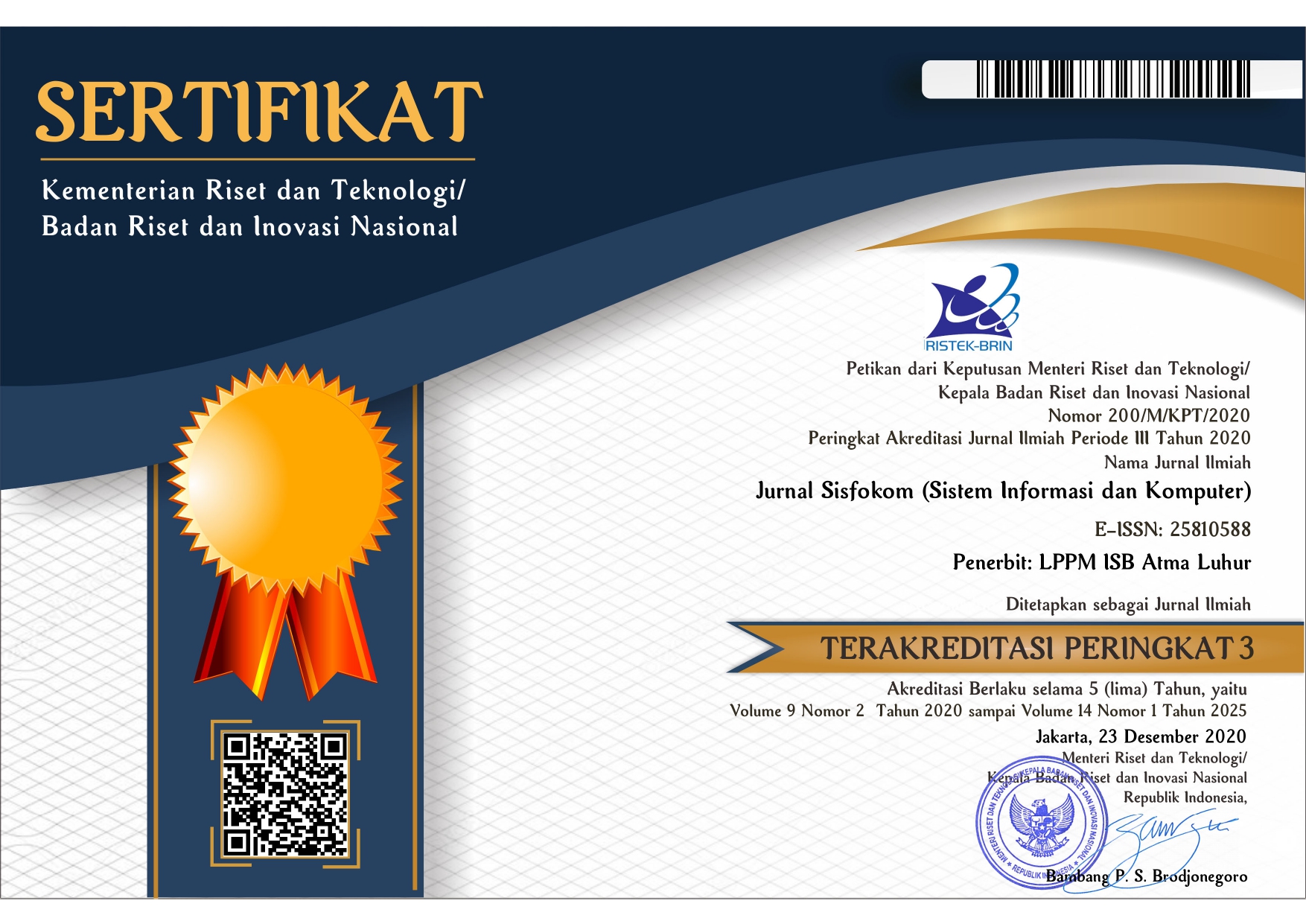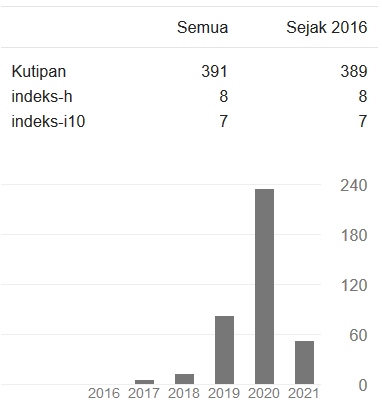Sentiment Analysis Pemutusan Hubungan Kerja Akibat Pandemi Covid-19 Menggunakan Algoritma NaïveBayes Dan PSO
DOI:
https://doi.org/10.32736/sisfokom.v10i3.1299Keywords:
PHK, Sentiment Analysis, Naïve Bayes, PSO, RapidminerAbstract
The Pandemic Covid-19 in Indonesia in 2020 had an impact on Termination of Employment (PHK), this has received various public opinions on social media. At a time when the poverty rate is high and unemployment increases every year, it becomes a factor of public disapproval of Termination of Employment (PHK). It is necessary to classify public opinion into a negative opinion or a positive opinion on this issue. The purpose of this study is to analyze the sentiment towards layoffs to determine negative or positive opinions using the Naïve Bayes algorithm by adding feature selection. The research stages consist of data collection, text preprocessing, feature selection, and application of algorithms. The testing process in this study uses the Rapid Miner application. The test results in this study using the Naive Bayes Algorithm, the accuracy value is 93.57% and for addition to the Naïve Bayes + PSO feature selection, the accuracy value is 93.71%. The best accuracy value in sentiment analysis of layoffs in the covid-19 pandemic is the addition of the PSO feature selection in the Naïve Bayes Algorithm, which is 0.14% better.References
WHO Covid-19, “WHO Coronavirus Disease (COVID-19) Dashboard,” World Health Organization, 2020. .
P. P. Agus, “Tidak Hanya di Indonesia, PHK Massal Terjadi di Seluruh Dunia,” CNBC Indonesia, 2020. .
“Undang-undang Nomor 13 Tahun 2003 tentang Ketenagakerjaan,” no. 13, Bandung: Citra Umbara, 2003.
C. A. Gian, “Korban PHK Akibat Corona Jadi Sorotan Jokowi,” CNBC Indonesia, 2020. .
S. Liao, J. Wang, R. Yu, K. Sato, dan Z. Cheng, “ScienceDirect CNN for situations understanding based on sentiment analysis of twitter data,” Procedia Comput. Sci., vol. 111, no. 2015, hal. 376–381, 2017, doi: 10.1016/j.procs.2017.06.037.
A. Sharma dan U. Ghose, “Sentimental Analysis of Twitter Data with respect to General Elections in India,” Procedia Comput. Sci., vol. 173, no. 2019, hal. 325–334, 2020, doi: 10.1016/j.procs.2020.06.038.
T. A. Lorosae dan B. D. Prakoso, “ANALISIS SENTIMEN BERDASARKAN OPINI MASYARAKAT PADA,” hal. 25–30, 2018.
O. Somantri dan D. Apriliani, “Opinion mining on culinary food customer satisfaction using naïve bayes based-on hybrid feature selection,” Indones. J. Electr. Eng. Comput. Sci., vol. 15, no. 1, hal. 468–475, 2019, doi: 10.11591/ijeecs.v15.i1.pp468-475.
F. Zamachsari, G. V. Saragih, Susafa’ati, dan W. Gata, “Analisis Sentimen Pemindahan Ibu Kota Negara dengan Feature Selection,” J. RESTI (Rekayasa Sist. dan Teknol. Informasi), vol. 4, no. 3, hal. 504–512, 2020.
Dr. Suyanto, Data Mining untuk Klasifikasi dan Klasterisasi Data, Edisi Revi. Bandung: Informatika Bandung, 2019.
W. A. Luqyana, I. Cholissodin, dan R. S. Perdana, “Analisis Sentimen Cyberbullying pada Komentar Instagram dengan Metode Klasifikasi Support Vector Machine,” vol. 2, no. 11, hal. 4704–4713, 2018.
S. Al Faraby, F. Informatika, U. Telkom, dan D. Frekuensi, “Analisis Dan Implementasi Support Vector Machine Dengan String Kernel Dalam Melakukan Klasifikasi Berita Berbahasa Indonesia Analysis and Implementation Support Vector Machine With String Kernel for Classification indonesian news,” e-Proceeding Eng., vol. 5, no. 1, hal. 1701–1710, 2018.
V. Kevin, S. Que, A. Iriani, dan H. D. Purnomo, “Analisis Sentimen Transportasi Online Menggunakan Support Vector Machine Berbasis Particle Swarm Optimization ( Online Transportation Sentiment Analysis Using Support Vector Machine Based on Particle Swarm Optimization ),” vol. 9, no. 2, hal. 162–170, 2020.
M. W. Fuad Nur Hasan, “ANALISIS SENTIMEN ARTIKEL BERITA TOKOH SEPAK BOLA DUNIA MENGGUNAKAN ALGORITMA SUPPORT VECTOR MACHINE DAN NAIVE BAYES BERBASIS PARTICLE SWARM OPTIMIZATION,” J. AKRAB JUARA, vol. 3, no. November, hal. 42–55, 2018.
L. Ardiani dan H. Sujaini, “Implementasi Sentiment Analysis Tanggapan Masyarakat Terhadap Pembangunan di Kota Pontianak Implementation of Sentiment Analysis of Community Responses to Development in Pontianak City,” vol. 8, no. 2, hal. 44–51, 2020, doi: 10.26418/justin.v8i2.36776.
I. T. S. A. Pamungkas, “ANALISIS SENTIMEN TERHADAP TOKOH PUBLIK MENGGUNAKAN ALGORITMA SUPPORT VECTOR MACHINE ( SVM ),” no. 1, hal. 69–79, 2018.
Downloads
Additional Files
Published
Issue
Section
License
The copyright of the article that accepted for publication shall be assigned to Jurnal Sisfokom (Sistem Informasi dan Komputer) and LPPM ISB Atma Luhur as the publisher of the journal. Copyright includes the right to reproduce and deliver the article in all form and media, including reprints, photographs, microfilms, and any other similar reproductions, as well as translations.
Jurnal Sisfokom (Sistem Informasi dan Komputer), LPPM ISB Atma Luhur, and the Editors make every effort to ensure that no wrong or misleading data, opinions or statements be published in the journal. In any way, the contents of the articles and advertisements published in Jurnal Sisfokom (Sistem Informasi dan Komputer) are the sole and exclusive responsibility of their respective authors.
Jurnal Sisfokom (Sistem Informasi dan Komputer) has full publishing rights to the published articles. Authors are allowed to distribute articles that have been published by sharing the link or DOI of the article. Authors are allowed to use their articles for legal purposes deemed necessary without the written permission of the journal with the initial publication notification from the Jurnal Sisfokom (Sistem Informasi dan Komputer).
The Copyright Transfer Form can be downloaded [Copyright Transfer Form Jurnal Sisfokom (Sistem Informasi dan Komputer).
This agreement is to be signed by at least one of the authors who have obtained the assent of the co-author(s). After submission of this agreement signed by the corresponding author, changes of authorship or in the order of the authors listed will not be accepted. The copyright form should be signed originally, and send it to the Editorial in the form of scanned document to sisfokom@atmaluhur.ac.id.









